Sometimes, you find yourself in a spot where you need money quickly. This can happen to anyone at any time. It’s not uncommon, and there are different reasons why it might happen. When this need for quick cash arises, it’s important to know what you can do.
There are several ways to get money fast, but it’s crucial to understand them well. Each way has its pros and cons. Knowing these can help you choose the best option for your situation. Making the right choice is important because it’s not just about solving your immediate money needs. You also have to think about how this choice will affect you later on. This blog will explore five common methods to get money quickly and talk about the pros and cons of each, helping you make a smart decision for both now and later.
1. Avail a Payday Loan
A payday loan is a type of short-term borrowing where a lender will provide high-interest credit based on your income. Typically, it’s a portion of your next paycheck. Payday loans charge high-interest rates for short-term immediate credit. They are also known as cash advance loans or check advance loans.
How it works: To get a payday loan, you typically write a check for the amount you are borrowing, plus a fee. The lender holds onto this check and gives you cash. Then, on your next payday, the lender cashes your check unless you extend the loan. Extending the loan, however, means more fees and interest.
Pros:
- Accessibility: One of the biggest advantages of payday loans is their accessibility. They are easy to get for almost anyone, even if you don’t have good credit. This is because lenders usually don’t check your credit history.
- Speed: Another big plus is the speed. In many cases, you can apply for a payday loan and get the money in your bank account the very next day. This is crucial if you need cash immediately for an emergency.
Cons:
- High Costs: The biggest downside to payday loans is the cost. Interest rates can be extremely high – sometimes as much as 400% or more. Additionally, if you can’t repay the loan on time, extra fees are added.
- Debt Trap Potential: This leads to another major issue: the potential for a debt trap. If you can’t repay the loan immediately, it can lead to a cycle where you keep borrowing more and get stuck in debt.
2. Using a Credit card
In India, using a credit card for sudden financial needs is quite common, offering a flexible way to manage expenses immediately. Credit cards provide a line of credit that can be used for various transactions, from online shopping to emergency payments.
How it works: When faced with an expense, you can use your credit card to directly pay for services or goods. This allows you to benefit from the credit period your card issuer provides, typically until your next billing cycle. This means you’re essentially borrowing money from the credit card company to pay for your purchases and then repaying it when your bill is due. It’s a convenient way to manage cash flow, especially if you’re in a temporary bind and expect to have funds available to clear your dues soon.
Pros:
- Immediate Access: Credit cards offer immediate access to funds within your credit limit, allowing you to make necessary payments without delay.
- Convenience: With widespread acceptance, credit cards provide a convenient and often safer alternative to carrying cash. They’re useful for both in-person and online transactions.
Cons:
- High-Interest Rates: If you don’t pay off your balance in full by the due date, you’ll be charged interest, which can be quite high. This can significantly increase the cost of your borrowed funds.
- Debt Accumulation: It’s easy to fall into the habit of spending more than you can afford with credit cards, leading to debt accumulation. Ensuring you spend within your means and pay off balances promptly is crucial.
- Credit Score Impact: Your credit score can be affected by how you use your credit card. High balances, late payments, or maxing out your credit limit can negatively impact your credit score, affecting your ability to borrow in the future.
3. Sell Personal Items
Selling personal items like jewelry, vehicles, or other valuable assets is a common and effective way to raise money quickly in India. Many turn to their cherished possessions such as gold jewelry, property, or even a vehicle when in need of immediate financial support.
How it works: To sell personal items, you might start by getting them appraised to understand their market value. For jewelry, especially gold, visiting a reputable jeweler or a pawn shop can give you an idea of the current market rates and the worth of your items. For vehicles, you may consult with dealerships, used car lots, or local mechanics to get an estimate. Once you have an idea of the value, you can sell these items to shops, through personal networks, or to specialized dealers who buy such assets.
Pros:
- Quick Cash: Gold jewelry and vehicles can usually be converted into cash fairly quickly. Gold, especially, is highly liquid in India and can be sold on short notice.
- Significant Returns: These items often hold substantial value and can provide a good amount of money, which might not be possible with smaller personal items.
Cons:
- One-Off Solution: Like any asset sale, once you sell, the item is gone. This means it’s a finite resource and isn’t a sustainable way to manage ongoing financial issues.
- Market Variability: The amount of money you can get depends on the current market value, which might fluctuate for gold, jewelry, or vehicles.
Selling personal items such as jewelry or vehicles is a viable option for immediate cash needs in India, but it’s important to consider both the financial and emotional implications. Ensure you deal with reputable buyers and understand the true value of your items to get a fair price.
4. Take a Loan Against Mutual Funds from FinEzzy
FinEzzy offers an innovative way to obtain a loan against mutual funds by using your mutual fund investments as security. This approach allows you to borrow money without selling your investments.
How it works: The process for getting a loan against your mutual funds with FinEzzy is digitized and user-friendly, involving a series of steps:
Step 1: Download the FinEzzy App and Fetch Your Mutual Fund Holdings
Firstly, you need to download the FinEzzy app. Once installed, use the app to sync and display your mutual fund holdings. This step is essential for FinEzzy to assess and verify your mutual fund assets.
Step 2: Check Credit Limit and Pledge Mutual Fund Units
The app will then calculate and show the credit limit you qualify for, based on your mutual funds’ current market value. You can choose the amount of mutual fund units you wish to pledge as security for the loan.
Step 3: Complete Paperless KYC
Next, complete the Know Your Customer (KYC) process through the app. This paperless procedure is fast and efficient, ensuring your identity verification aligns with financial regulations.
Step 4: Voila! Receive your Instant Loan Against Mutual Funds within 15 minutes!
After your KYC is approved and your mutual funds are pledged, FinEzzy processes the loan request. Typically, the funds are transferred to your account within 15 minutes, providing a swift solution to your cash needs.
Pros:
- Lower Interest Rates: Loan against mutual funds generally offer lower interest rates than unsecured loans because your mutual funds secure the loan.
- No Liquidation: You retain your investments and their growth potential.
Cons:
- Risk of Losing Investment: If you’re unable to repay the loan, there’s a risk of your mutual fund investments being liquidated.
- Eligibility Criteria: A range of mutual fund investments may be eligible for these loans, but not all. Eligibility typically depends on the fund type, performance, and market conditions. It’s important to check with the lender to understand which of your investments qualify.
loans against mutual funds is a quick and efficient method to access funds without having to liquidate your investments. The straightforward, four-step process of obtaining an instant loan against mutual funds, combined with the benefits of retaining your investments, makes it an appealing option for those in need of immediate financial assistance. However, it’s crucial to be mindful of the risks and ensure your investments meet the necessary criteria.
Do you want to learn more? Delve deeper into the significance of “Why loans are important in emerging countries like India” and their role in economic development in our related article.
5. Borrow from Friends/Relatives
Borrowing money from friends or relatives is a common way to handle a financial crunch. It involves asking people you know and trust for a loan, rather than going to a bank or using a credit card.
Pros:
- Flexibility: One of the biggest advantages of borrowing from friends and family is the flexibility it offers. Often, these lenders are more understanding and can offer more lenient repayment terms than traditional financial institutions. They may allow for a longer repayment period, or even be open to adjusting the terms if your financial situation changes.
- No or Low Interest: Another significant benefit is the absence or minimal presence of interest. Unlike banks or other lending institutions, friends and family usually don’t charge high-interest rates, and some might not charge any interest at all.
Cons:
- Relationship Risk: The major downside of borrowing money from friends or relatives is the potential strain it can put on the relationship. Money issues can lead to misunderstandings, resentment, or hard feelings, especially if the repayment doesn’t go as planned.
- Lack of Formality: The informal nature of such loans can sometimes lead to problems. Without a formal agreement, there can be confusion about the terms of the loan, such as the repayment schedule, interest, if any, and what happens if you can’t repay on time.
Borrowing from friends or relatives can be a flexible and low-cost option for obtaining funds quickly. However, it’s important to consider the potential impact on your relationships. It’s often advisable to treat the loan as you would from a formal lender, which includes being clear about repayment terms and even drafting a simple written agreement to avoid any future misunderstandings.
Conclusion: Each of these options has its place depending on your specific needs and circumstances. While loans against mutual funds with services like FinEzzy offer a balanced way to manage urgent financial needs without selling off assets, every method should be considered carefully. Remember, the key is not just to solve the immediate cash crunch but to ensure it aligns with your broader financial health and relationships. Make your choice wisely and understand the terms and implications of each option to navigate your financial challenges more smoothly.





